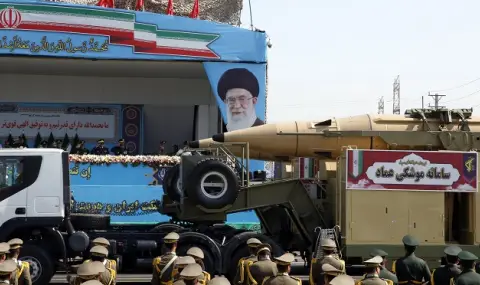With any outbreak of fever in the region, the Iranian nuclear problem imposes itself with all its weight, but discreetly, often in the background, like a ghost roaming the dungeon. This is what political analyst Isabel Lasser wrote in an article for the French newspaper Le Figaro.
Like Iran's response last week, the Israeli response was sufficiently calibrated to provide for a temporary easing of direct tensions or even a pause in the logic of escalation, with neither side interested in all-out war today. But the symbolism will remain.
By striking an airbase in the Isfahan area, not far from the Natanz nuclear facilities, one of the heartlands of the military program that is quietly leading the Islamic Republic toward the bomb, the Israelis showed they can reach deep into Iran's territory despite anti-aircraft defense. The Jewish state sent a clear message: "We are reacting measuredly, but make no mistake. We chose not to strike your nukes this time, but we could have. Your nuclear facilities are vulnerable to attack by our aviation, which has long-range strike capabilities that cannot be detected by your air defenses," commented David Halfa, co-director of the Observatory for North Africa and The Middle East to the "Jean Jaures" foundation.
This is the elephant in the room, the shadow that defines the geopolitical life of the Middle East. With each outburst of nervous agitation in the region, the Iranian nuclear issue looms large, but discreetly, often in the background, like a specter lurking underground. Iran's military program is at the heart of the restraint that has prevailed in Tehran since the start of the Gaza war. Acting through its cronies, Iran has been able to expand its influence in the region by presenting itself as the leader of the Islamic "resistance" while giving the final push to its nuclear program, one of its main strategic goals. By provoking a general confrontation with Israel, he would run the risk of the United States intervening against its nuclear installations.
The topic is also on the minds of all Israeli officials, who have vowed several times that "by all means" will prevent Iran from acquiring nuclear weapons. It is fueling scenarios for strikes against Iranian centrifuges. This undoubtedly fuels the caution of the IDF, which can hardly fight on two fronts at the same time. As Ifri expert Eloise Fayette writes, "Israel's best chance to curb Iran's nuclear program is to do nothing, because Iran risks manipulating the threat to justify proliferation.
It is clear that, for the time being, the quiet battle that has pitted the Islamic Republic against Western powers over the nuclear issue for twenty years has turned in Iran's favor. Despite painful efforts by European and American diplomats, the nuclear deal (JCPOA) signed in 2015 with Iran is dead, although Western officials still maintain that it is not impossible to resurrect it. It has become an "empty shell", in the words of the International Atomic Energy Agency (IAEA). It was torpedoed by Donald Trump, who thought that by withdrawing he could apply "maximum pressure" on the Iranian regime and impose a new, more stable deal on it. It was then finally finished off by Iran's resumption of the frenzied uranium enrichment race since 2019. To such an extent that today the country has become a nuclear "threshold state", that is, it has the technological capacity for rapid production of a bomb.
Thanks to the war in Ukraine, the rapprochement between Russia and Iran, which supplies drones to Moscow, has dashed any hope - already slim - of renewed talks. As Eloise Fayette explains in an Ifri note, "Russia now advocates the "anti-imperialist" axis by supporting Iran against Western demands." In the absence of a Plan B, monopolized by the war in Ukraine, Western diplomacy has lowered the Iranian nuclear problem in the order of its priorities.
Even the ultimate, military solution, which again tempts Israeli officials and even some American Republicans, seeing in it an "opportunity" to be seized thanks to the war in the Middle East, seems illusory. According to most experts, Israel does not have enough bunker busting bombs capable of reaching nuclear facilities that are deeply buried and even sometimes, as with Fordow, hidden under a mountain. As for the US administration, which wanted to escape Europe and the Middle East to head for the Pacific, it has shown little appetite for opening a new front with Iran, along with Israel. Iran's rapprochement with Russia and China could further guarantee the Islamic Republic new defense technologies that would make future attacks against Iran more difficult.
Even if it is possible to "buy time" for the bomb by striking the centrifuges or by increasing acts of sabotage and targeted killing, Iran's nuclear knowledge is irreversible. Once acquired, they cannot be deleted. And as the Ifri specialist points out, "it is illusory to bet on regime change as a solution to nuclear energy... It is not certain that a new government would be more favorable to an agreement". Nor for "rejection" from nuclear weapons, which may, on the contrary, "protect his access to power". The recent example of Ukraine, which agreed in 1994 in the Budapest Memorandum to get rid of its nuclear warheads in exchange for guarantees of its security and territorial integrity, and which, disarmed, became a victim of Russia, can only support Iran's march towards bomb, whatever the regime in Tehran.
Like the Middle East, the subject now ranks among the near-impossible-to-solve equations. But with serious consequences for the region. An Iranian nuclear bomb would multiply Tehran's capacity for regional destabilization. It is also likely to resume its spread, especially in the Sunni countries of Saudi Arabia, Turkey and Egypt.
